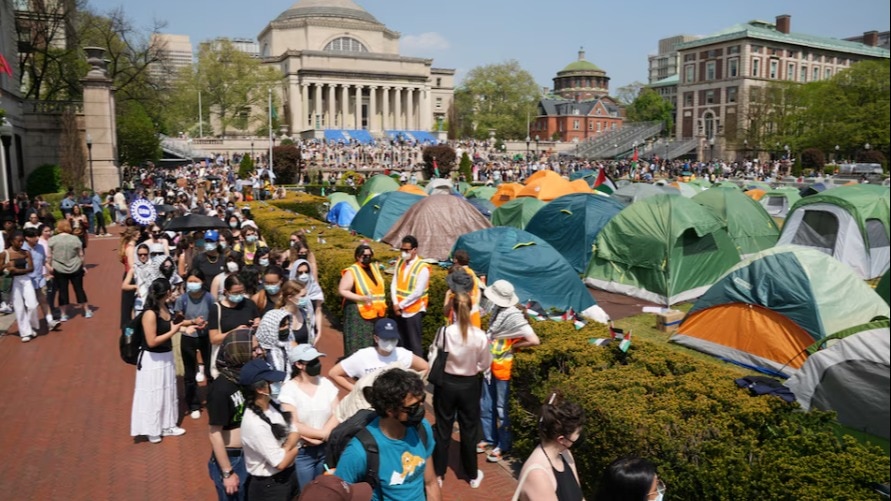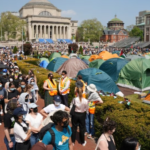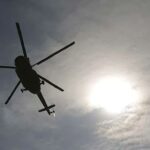South Korea is cautiously optimistic about the planned upgrade of the alliance between the United States and Japan to strengthen security in East Asia and the Indo-Pacific region.
A spokesman for South Korea’s Foreign Ministry said the ministry “noted” that the United States and Japan talked about “the defensive nature of the U.S.-Japan alliance” at their summit in Washington last week and emphasized “peace and stability” in the region.
The spokesperson went on to tell VOA’s Korea Service via email on Friday that “South Korea, the United States and Japan are working to institutionalize expanded trilateral cooperation through the agreement reached at Camp David last year” and “strengthen rules-based international cooperation.” order”.
Seoul and Tokyo held a trilateral summit at Camp David in August after the two countries repaired ties stemming from a dispute over Japan’s 1910-1945 colonial rule of the Korean peninsula.
At a bilateral summit in Washington on April 10, Washington and Tokyo announced broad plans to improve military ties.
The plan includes preparations for Japan to work with the United States to develop and produce military hardware, including hypersonic missile interceptors.
U.S. Ambassador to Japan Rahm Emanuel visited Mitsubishi Heavy Industries’ F-35 fighter jet factory near Nagoya on Tuesday. He emphasized Japan’s importance in weapons manufacturing as crises in Europe and the Middle East strain U.S. supplies.
Plans announced at the summit also call for Japan’s possible participation in the AUKUS Pillar 2 security agreement, allowing it to develop quantum computing, hypersonics, undersea and other advanced technologies.
AUKUS is a defense and security organization for Australia, the United Kingdom and the United States. The second pillar of AUKUS refers to a series of cooperative activities carried out by the three countries to develop and deploy “advanced capabilities”.
Japan will hold trilateral exercises with the United States and Britain starting in 2025 as the Indo-Pacific and Euro-Atlantic regions become “closer,” the joint statement said.
The plan calls for Japan to expand its security role and military buildup while working to implement a national security strategy to be released in 2022. This requires Japan to increase its defense budget and shift from a purely defensive policy to one that includes counterattack capabilities under threats from North Korea and China.
In December, Japan relaxed its arms export control system, which allows it to sell parts but not finished weapons.
“Japan’s armament buildup can be seen as a double-edged sword,” said Cho Han-beom, a senior researcher at South Korea’s Institute for National Unification.
In an interview with VOA’s Korean Service on Monday, he said that the military buildup greatly helps contain the threats of China’s military and North Korea’s nuclear weapons, but it worries South Korea.
He said “trust” between the two countries’ militaries “has not been fully restored” even though they now work together because of unresolved historical disputes over Japan’s colonization of Korea from 1910 to 1945.
From April 11 to 12, South Korea, Japan and the United States conducted a two-day joint naval exercise in the East China Sea. The drills include anti-submarine warfare drills to counter North Korea’s underwater threats and interception exercises aimed at blocking North Korean weapons shipments.
South Korea, under President Yun Seok-yeol, has pursued a policy of reconciliation with Tokyo and worked closely with Washington to counter Beijing’s economic and military coercion.
Under Moon Jae-in’s previous administration, Seoul relied on the United States for security while strengthening economic ties with China. Relations with Tokyo remain tense.
Despite Yoon’s outreach to Tokyo, anti-Japan sentiment remains high in much of South Korea, especially among progressives who increased their majority in the April 10 parliamentary election.
South Korea’s Foreign Ministry on Tuesday protested Japan’s claim to a disputed island halfway between the two countries, which South Korea calls Dokdo and Japan calls Takeshima.
Won Gon Park, an adjunct professor of North Korean studies at Ewha Womans University in Seoul, said South Korea must now “make a choice” whether to cooperate more closely with Japan to deal with threats from North Korea and China.
In an interview with VOA’s Korean service, he said this may be necessary because the United States is building regional security structures to strengthen defenses against China.
The US-Japan summit also announced plans to revise the command structure of the US military in Japan. This will complement Japan’s plan to establish a joint combat command to improve the coordination of its air, ground and maritime forces by 2025.
Bruce Bennett, a senior defense analyst at the RAND Corporation, said Washington is “increasingly eager to engage global partners” to step up weapons manufacturing because the United States does not produce enough military hardware to counter all threats from Russia, China, North Korea and others. . Iran.
Bennett said in a phone interview with VOA on Friday that the summit announced that “Japan will become a global partner” that will allow the United States to share highly sensitive “information, technology and other capabilities in exchange for assuming security and stability responsibilities.” Outside Northeast Asia. “
He added that “the United States recognizes that South Korea cannot afford to send multiple divisions to other parts of the world because of the North Korean threat” but is “eager” for South Korea to play a deeper global role, particularly in India. Pacific Ocean.
Kim Hyung-jin contributed to this report.
Follow us on Google news ,Twitter , and Join Whatsapp Group of thelocalreport.in
















